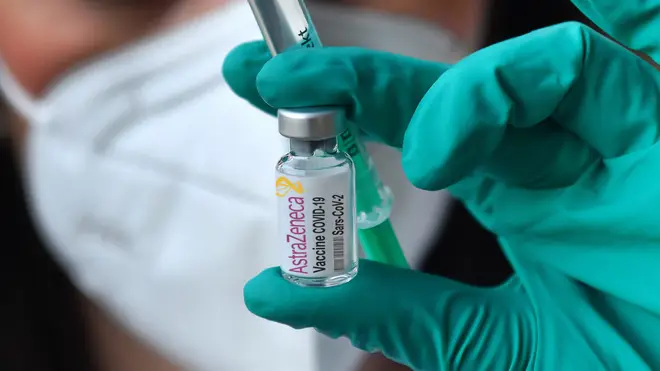
Iain Dale 7pm - 10pm
7 January 2021, 07:51

GP surgeries across England can begin administering the Oxford-AstraZeneca coronavirus vaccine after the UK's death toll topped 1,000 for the first time.
Britain faces a race to protect the vulnerable and the rest of the population before they can become infected with Covid-19.
The mass drive to vaccinating the public will take a considerable step forward on Thursday with GP surgeries now free to administer the Oxford-AstraZeneca jab.
It comes after the UK reported a further 1,041 Covid-related deaths as of Wednesday - the highest daily reported total since 21 April.
Record numbers of patients are also currently in hospital with Covid, with a further 3,500 admitted in England on Monday.
Boris Johnson, who was given the overwhelming backing of MPs for the latest lockdown, warned that there was now a race between the spread of the virus and the delivery of vaccines to the most vulnerable.
The House of Commons, recalled from its Christmas break to vote on the new restrictions on Wednesday, voted with a 508 majority for the measures, which could be in place until the end of March.
Read more: UK records 62,322 new Covid cases and 1,041 more deaths
Read more: Boris Johnson: UK in final 'sprint' to defeat coronavirus

MPs approve England's third national Covid lockdown
"After the marathon of last year we are indeed now in a sprint, a race to vaccinate the vulnerable faster than the virus can reach them," the prime minister told MPs.
"Every needle in every arm makes a difference."
It is hoped that more than 700 sites will be delivering vaccines by the end of the week, with the Oxford-AstraZeneca vaccine easier to administer given it can be stored at fridge temperatures, unlike the Pfizer jab which requires storage at minus 70C.
Seven mass vaccination centres will open next week in London, Newcastle, Manchester, Birmingham, Bristol, Surrey and Stevenage.
Vaccines minister Nadhim Zahawi admitted the target of vaccinating around 14 million people in the highest priority groups - including the elderly, those with clinical needs, care home residents and staff as well as frontline NHS workers - by February 15 was "stretching".
Read more: MPs approve new lockdown measures for England
Read more: Seven mass Covid vaccination hubs to open across UK next week

Man becomes first in world to receive Oxford vaccine
Some 1.3 million people have already received either the Pfizer-BioNTech or Oxford-AstraZeneca jab.
According to a report in the Daily Mail, the bid to increase the speed of inoculations will see the approval period needed for Covid vaccine batches slashed from 20 days to just four.
The Medicines and Healthcare Regulatory Agency (MHRA), the body responsible for the checks, is also set to increase staffing in a bid to accelerate the programme, the paper reported.
Ministers have already decided, in a move queried by the World Health Organisation (WHO), to administer the first jab to as many priority patients as possible by delaying a second shot.
The second jab will be given up to 12 weeks later to prevent current supplies from being held back. In the clinical trials for the Pfizer vaccine, people received a follow-up shot 21 days after the first.

Matt Hancock hails Oxford vaccine "big moment for British science"
But in the Oxford University vaccine study, the timetable for a second vaccine was much more varied, with many not getting a second jab for several weeks.
Mr Johnson was given approval for the latest lockdown in the Commons but faced rebellion within his ranks, with 12 Conservative MPs voting against the stay-at-home rules. They were joined by four DUP MPs opposing the regulations.
In the face of pressure from senior Tories to commit to easing the restrictions - which came into force on Wednesday and were being voted on retrospectively by MPs - as soon as possible, Mr Johnson said there would be "substantial opportunities" for relaxation before March.
Mark Harper, an ex-government chief whip and chairman of the lockdown-sceptic Covid Recovery Group, said the restrictions should be reviewed "in the middle of February" once the most vulnerable had been vaccinated, as per the government's aim.
The result came as government data confirmed that the Covid death toll had once again reached levels not seen since the peak of the first wave in 2020.

Oxford vaccine chief: Jab up to 90% effective against Covid-19
However, the figures continue to be affected by a lag in the publication of recent data and contain some deaths that took place over the Christmas and New Year period that have only just been reported.
Of the 1,041 new deaths, around a third took place before 1 January, while some 100 took place in the seven days up to Christmas Day.
After the latest mortality figures were released, Labour leader Sir Keir Starmer said ministers had to shoulder some of the blame.
"This is a tragedy. It's not bad luck. It was not inevitable," he tweeted.
"The government has been too slow to react. We now need a national effort to get our country vaccinated."
Listen & subscribe: Global Player | Apple Podcasts | Google Podcasts | Spotify